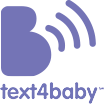Resources for New Moms
- Baby’s Development
- Tips & Resources
- Feeding Baby
- Health & Safety
- Well-Child Visits & Vaccines
- Well-Child Visit Guides
- Vaccines
- Finding Free Vaccines
- Making Shots Less Stressful
- Protect Baby from Pertussis (Whooping Cough)
- Vaccine Information for Babies
- Vaccines: DTaP
- Vaccines: MMRV
- Vaccines: Hepatitis A
- Vaccines: Hepatitis B
- Vaccines: Hib
- Vaccines: Rotavirus
- Vaccines: PCV
- Vaccines: Polio (IPV)
- Vaccines: Seasonal Flu
- Vaccines: Varicella
- Parenting
Baby's Language Development
Q:
I think my 9-month-old understands a lot of what I'm saying when I talk about her toys. Could she?
Yes
Correct!
Before they can say many, if any, words, your baby probably understands more than you think. Watch how they respond when you mention a toy across the room. If she looks toward it, she is telling you she understands.
No
Incorrect!
Before they can say many, if any, words, your baby probably understands more than you think. Watch how they respond when you mention a toy across the room. If she looks toward it, she is telling you she understands.
Do you notice the coos, gurgles, and screeches of earlier months are now turning into sounds you recognize like “ba,” “da,” “ga,” and “ma?” Even though you’ve been talking to your baby from birth, they now understand more language. Before baby can say very many, if any, words, they’ll probably understand more than you think. You may find that using simple “signs” in addition to words can help your baby understand what you’re trying to say. Look up baby sign language for milk, more, and please, and try using them alongside the spoken words.
To help your baby increase their understanding, keep talking as much as possible. Tell baby what’s happening around them and use the same words over and over when you talk about things. For example – if you call the family pet a cat today, don’t call it a kitty tomorrow.
Picture books can help babies understand that everything has a name. Choose books with large cardboard, cloth, or vinyl pages that they can turn themselves. Also look for simple but colorful pictures of things your child will recognize.
When you are reading or talking, give plenty of time for your baby to “talk” to you. Ask questions and wait for a response. Or let them take the lead. If they say “Gaagaagaa,” repeat it back and see what happens. This lets your baby know how to communicate and that you want them to.
For your baby, a “word” is any sound that refers to the same person, object, or event. So, if they say “mog” every time they want milk, you should treat “mog” as a word. When you respond to your baby, however, use “milk,” and eventually they will too.
There is a lot of variation when children begin to talk. Some have a vocabulary of two to three words by their first birthday. More likely, your baby’s speech at twelve months will consist of a sort of gibberish that has the tones of speech. If your baby is trying to make sounds, they are getting ready to talk.

